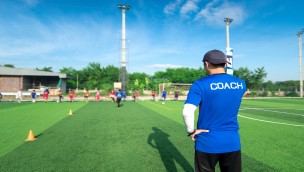What about the mental part in sports?
Throughout the sport and life, young athletes will experience challenges, ups-and-downs and will go through a wide spectre of emotions.

Adolescence is a time of great change, physically, mentally and emotionally. It's a time to form your own identity, develop values and find your place. Adolescents are more emotionally driven than adults, and it's common for them to feel stressed, pressured, nervous, sad, worried and scared.
Physically, there are big differences between young people in terms of fitness levels, recovery and endurance. Mentally, there are also big differences in how they deal with ups, downs and emotions. But, just as with physical training, you can train to become better at dealing with the mental.
Stress and pressure are natural parts of life. In many cases it can have a positive impact on us, but if young people experience stress and pressure that exceeds their ability to cope with it over time, it can take over and have negative consequences. With a supportive coach or parent and a safe training environment, sport can be a great arena for learning to manage pressure and stress. However, in some cases, sport can also contribute to more pressure and stress than the young person is able to handle, with negative consequences.
Pressure
Pressure can come from their own expectations or from others, such as parents, coaches or friends. What expectations young people set for themselves, how they perceive expectations from others and how they deal with these expectations will vary greatly. Many sets high standards for themselves and want to succeed in all areas. If expectations are too high and you fail to live up to them, it can lead to self-criticism, dissatisfaction and feelings of failure.
The figure shows a stressed and pressured “me” in the middle and all the small figures around symbolize all your own and others' expectations of how you should live, what you should do and how you should perform.
Stress is a physical reaction
Stress is a physical reaction that can affect performance both positively and negatively. Stress leads to various physical reactions in our body that basically make you sharper, concentrate better, become more alert and quickly get more energy. Stress is good for performance with moderate stress over a short period of time! If, over a long period of time, you experience higher or more demands than you are able to cope with, this can lead to long-term negative stress. This can affect sleep, mental health and performance, and increase the risk of injury.

Stress affects injury risk
Stress can be caused by both large and small events, such as a break-up with a girlfriend or boyfriend, the loss of a close relative or smaller things like losing your mobile phone. Studies show that increased stress over time increases the risk of injury. High stress can have a negative impact on concentration, focus and coordination, which increases the risk of accidents and injuries. High total workload and stress can also weaken the immune system and increase the risk of illness.
Measures to reduce stress and can also reduce the risk of injury
On the positive side, it has also been shown that “daily uplifts”, i.e. small situations that make you feel happy (e.g. someone saying something nice to you or feeling “seen”), can help reduce stress and thus possibly also reduce the risk of injury. What's more, it's not just warm-up programs and strength exercises that have been shown to reduce the risk of injury. Some studies have also shown that using mental training techniques such as progressive muscle relaxation and visualization can reduce both stress and risk of injury.
If you're interested in mental training, check out this link to Olympiatoppen's mental training resource page where practical examples of different mental training techniques are shown.
Practical tips for reducing stress during exercise:
- Schedule exercises at times and places that cause the least amount of stress.
- Plan well and have fixed training times.
- Have some time together before training starts to adjust.
- Ensure a positive meeting with everyone and that everyone feels seen.
- If someone seems stressed, have a talk/chat with them. This can be an effective injury prevention measure.


